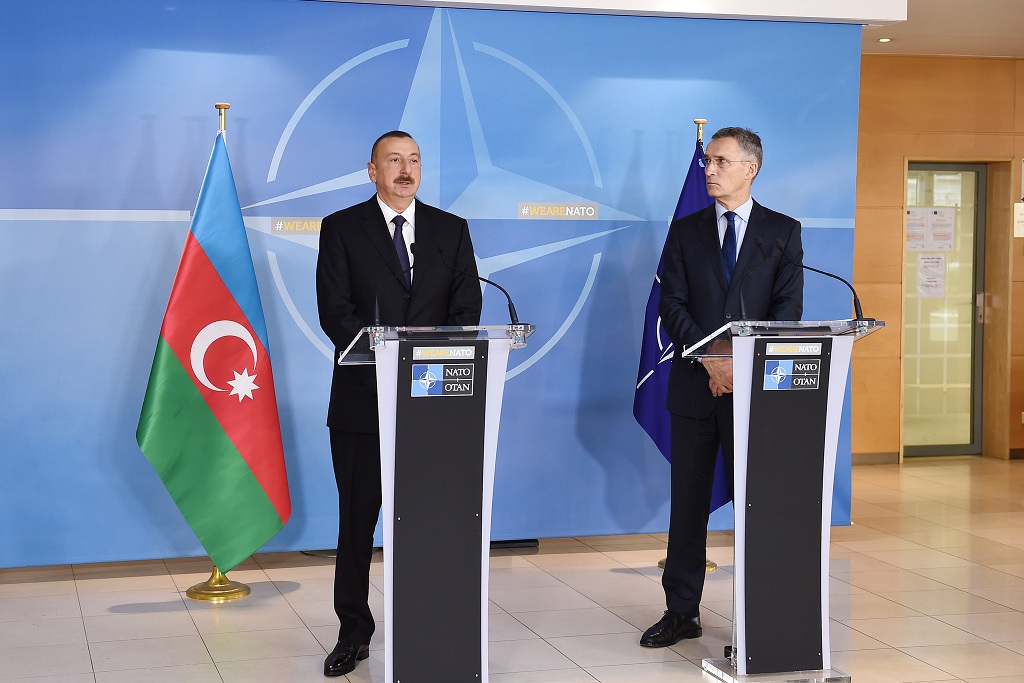Azerbaijan’s relationship with NATO was in the spotlight this week during Azerbaijani President Ilham Aliyev’s visit to Brussels on November 23, when he met with the NATO Secretary General Jens Stoltenberg. There he reviewed Azerbaijan’s contributions to Afghan security in the framework of the security bloc, and said the biggest threat to regional security in the Caspian and South Caucasus region is the unresolved Nagorno-Karabakh conflict.
“Our cooperation has already good history. Azerbaijan participated in many NATO operations: in KFOR (Kosovo Forces), in ISAF (International Security Assistance Force), and now Azerbaijan is contributing to Resolute Support Mission,” Aliyev said during a joint press conference in Brussels, according to the president’s official website.
Azerbaijan has been contributing to the 29-member military coalition’s operations since 1992, shortly after the country was founded following the collapse of the Soviet Union. Contributions to ISAF in particular have included sending nearly 100 servicemen to Afghanistan to help provide security to a television tower station in Kabul, a central ammunition depot, and conduct regular patrols in the capital. Since January 2015, Azerbaijan’s peacekeeping contingent of 94 soldiers has operating under the NATO’s mission known as Resolute Support, and was tasked with providing security of Kabul International Airport.
In 1994, Azerbaijan teamed up with NATO through the Partnership for Peace program, which led to the creation of an Individual Partnership Action Plan (IPAP) that is revised and agreed upon every two years. IPAPs require holding regular political dialogues, systematizes bilateral cooperation as an overarching tool, and agreeing on new areas of cooperation of mutual interest in a more flexible manner.
“Azerbaijan joined Individual Partnership Action Plan since 2004 and completed four cycles. The fifth cycle is being conducted now and it’s also a very important element of our cooperation,” President Aliyev said Thursday.
“The biggest threat to regional security is unresolved conflict between Armenia and Azerbaijan. For many years, our territories are under Armenian occupation. More than one million Azerbaijanis became refugees and internally displaced persons. Ethnic cleansing policy was conducted against Azerbaijanis and the situation is not changing unfortunately,” Aliyev said Thursday, bringing one of the worlds long-lasting conflicts into the spotlight.
“The resolution of the conflict must be based on relevant resolutions of Security Council of United Nations and territorial integrity of Azerbaijan,” Aliyev noted, stressing the significance of four resolutions that were passed by the body in 1993 and calling for Armenia to withdrawal all of its forces from Azerbaijan, but go unfulfilled.
The Nagorno-Karabakh region of Azerbaijan turned into a battlefield following the fall of the Soviet Union. By 1992 Armenia had launched a military aggression against Azerbaijan. The war claimed the lives of over 20,000 Azerbaijanis, displaced nearly one million, and resulted in Armenia occupying Azerbaijan’s Nagorno-Karabakh region and seven surrounding districts that amount to 20 percent of Azerbaijan’s internationally recognized territory.
The war ended in a ceasefire signed in 1994, but violations are not uncommon. The two sides last went to war in April 2016, and over a period of four days Azerbaijan managed to regain some of key strategic outposts on the Line of Contact.
Stoltenberg called the conflict “a matter of concern.”
“It is clear that there is no military solution to this conflict. And NATO has no direct role, Stoltenberg said. “We support the work of the OSCE Minsk Group co-chairs. And I am encouraged to hear about your renewed dialogue with the President of Armenia,” Stoltenberg said, referring to the co-chairmanship that was set up in 1992 by the OSCE to help resolve the issue peacefully.
The presidents of Armenia and Azerbaijan last met in October in Geneva. Next month, their respective foreign ministers will meet in Vienna to take up the issue.







 Russian Foreign Minister Sergei Lavrov has reasserted that Moscow has no intentions to stop the fighting in Ukraine, even if peace talks commence.
Russian Foreign Minister Sergei Lavrov has reasserted that Moscow has no intentions to stop the fighting in Ukraine, even if peace talks commence.
 Iran has refuted reports of alleged damage to Shimon Peres Negev Nuclear Research Centre located southeast of Dimona, Israel, during the recent air...
Iran has refuted reports of alleged damage to Shimon Peres Negev Nuclear Research Centre located southeast of Dimona, Israel, during the recent air...
 Iran’s Foreign Minister, Hossein Amir-Abdollahian, has labeled a foiled Israeli drone attack in certain parts of the country as a "failure" for Isr...
Iran’s Foreign Minister, Hossein Amir-Abdollahian, has labeled a foiled Israeli drone attack in certain parts of the country as a "failure" for Isr...



